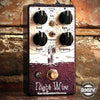My shopping cart
Your cart is currently empty.
Continue Shopping4727 N Damen Ave Chicago, IL 60625 | 773.878.8616 | rocknrollvintage@gmail.com | Showroom Hours: 12-6pm Tuesday-Friday | Saturday 12-5pm (Closed: Sunday/Monday)
EarthQuaker Devices Night Wire V2




The Night Wire is a feature-rich harmonic tremolo. What is harmonic tremolo? In short, the signal is split into high pass and low pass filters, then modulated with an LFO that is split 180 degrees. The Night Wire takes the traditional harmonic tremolo a few steps further by allowing the center point of both filters to be adjusted for different tones. The filter frequency has three modes: Manual, LFO and Attack. In Manual mode, the center point can be set to a fixed position with the frequency control. In LFO mode, the filters are continuously swept and the frequency control adjusts the speed. In Attack mode, the filters are dynamically swept according to pick attack and the frequency control acts as a range control, much like a standard envelope filter. The tremolo section has two modes, Manual and Attack. In Manual mode, the speed of the tremolo is governed by where the rate control is set. In Attack mode the speed is controlled by pick attack and the rate controls the sensitivity; the harder you pick, the faster the rate and vice-versa. The tremolo can be subtle and shimmery or full-on throbbing depending on where the depth control is set. With the depth set to zero, the Night Wire will act like a fixed filter, phase shifter or envelope-controlled filter depending on which mode the filter frequency is in. It also features a cut/boost volume control to get your levels just right. Each Night Wire is hand made one at a time in the moonlit village of Akron, Ohio.
Controls Rate Toggle: This toggle lets you select between two ways to control the speed of the tremolo. Attack lets you adjust the speed by pick attack. In this mode, the Rate knob controls the sensitivity of the dynamic tremolo. The higher the rate and harder you pick, the faster the speed will rise and vice versa. In Manual mode, the Rate control adjusts the speed like a common tremolo.
Frequency Toggle: This toggle lets you select one of 3 different ways to control the center frequency of the filter section. In LFO mode, the frequency is continuously swept by an LFO. In this mode, the Frequency knobs adjusts the speed of the LFO. In Manual mode, the frequency is determined by where the Frequency knob is set. In Attack mode, the center frequency is dynamically controlled by pick attack and the Frequency knob adjusts the sensitivity.
Level: Sets the output level, unity is around noon.
Depth: Adjusts the depth of the tremolo. More clockwise, less counterclockwise. When fully counterclockwise, the amplitude modulation will be removed and the Night Wire will function as a fixed filter, envelope controlled filter or phaser depending on where the frequency toggle is set.
Rate: In manual mode, this controls the speed of the tremolo. Faster speed clockwise and slower speed counterclockwise. In Attack mode, this controls the sensitivity of the dynamic tremolo. The higher the rate and harder you pick, the faster the speed will rise and vice versa.
Frequency: Controls the center frequency of the filters in manual mode: higher clockwise, lower counterclockwise. In LFO mode this controls the rate of the sweep: faster clockwise and slower counterclockwise. In Attack mode this controls the sensitivity of the envelope: lower Frequency gives slower rise and lower peak, higher Frequency gives faster rise and higher peak. Simple, right?
Measures 4.75″ x 2.50″ x. 2.25″ with knobs
Flexi-Switching This device features Flexi-Switch™ Technology! This relay-based, true bypass switching style allows you to simultaneously use momentary and latching style switching.
For standard latching operation, tap the footswitch once to activate the effect and then tap again to bypass. For momentary operation, hold the footswitch down for as long as you’d like to use the effect. Once you release the switch the effect will be bypassed. Since the switching is relay based, it requires power to pass signal.
Power The Night Wire should be powered by a standard 9-volt DC power supply with a 2.1mm negative center barrel. We always recommend pedal-specific, transformer-isolated wall-wart power supplies or multiple isolated-output supplies. Pedals will make extra noise if there is ripple or unclean power. Switching-type power supplies, daisy chains and non-pedal specific power supplies do not filter dirty power as well and let through unwanted noise. Do not run at higher voltages!
Current Draw: 78ma Input Impedance: 1M Output Impedance: <1K